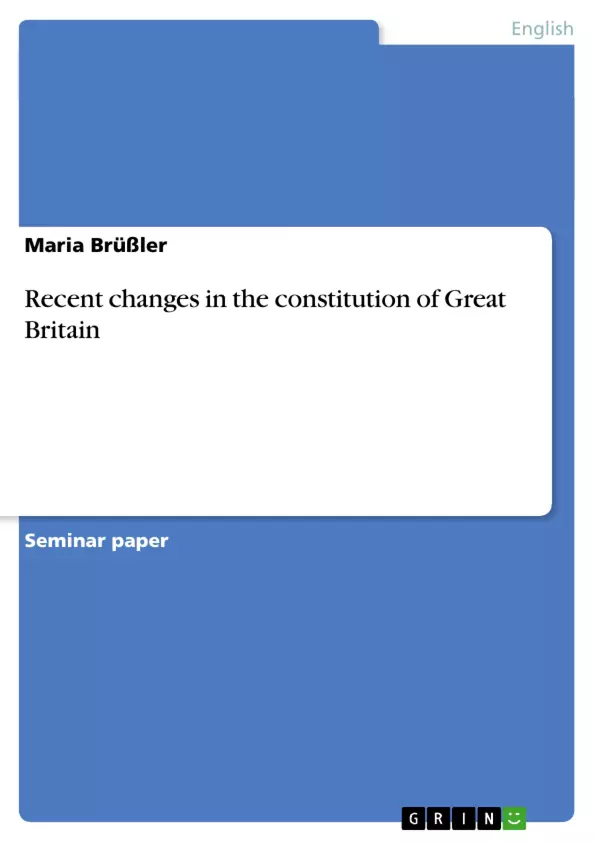Before dealing with the actual topic it is necessary to explain how the current
situation could arise. This will be done in the following with a very brief overview
over the history of the British constitution and its main sources.
The first document belonging to the constitution is the Magna Charta from 1215.
It was to protect the rights of the community against the Crown. As a result of the
Declaration of Rights the powers of Parliament were extended by the Bill of
Rights in 1689. Thirdly in 1832 was the Great Reform Bill which reformed the
system of Parliamentary representation. The last great reforms were in 1911 the
Parliament Act which decreased the power of the House of Lords and in1918 the
Representation of the People Act which gave women over 30 the right to vote. As
a result of this development the British people are not citizens as in any other
modern, democratic state but they are subjects of the Crown and accept the Queen
as their head of state.
It can be seen that the constitution dates back almost 800 years. This is much
more than many other constitutions, for example the German one. As one can
imagine it has undergone many grave changes. During the 18th century it was an
aristocratic 'balanced' constitution. In the course of the Victorian Age it became a
middle-class liberal constitution which developed to the liberal democratic constitution
that it is today. Furthermore a few words to the process of change have to
be said in advance. This process consists of dialogue between the forces of conservation
on the one hand and the forces of transformation on the other. The resulting
upshot is always a compromise which represents the terms and arrangements
on which a country can be ruled and which the people will accept.1
1 Coxall, Bill/Robins, Lynton: Contemporary British Politics. London: Macmillan Press Ltd, 1998,
p. 165
Inhaltsverzeichnis (Table of Contents)
- Introduction
- Attitudes towards the constitution and its changes
- Reforms of Parliament
- Electoral Reform
- Individual Rights
- Devolution and regional government
- Written constitution or not
- Conclusion
Zielsetzung und Themenschwerpunkte (Objectives and Key Themes)
This paper examines the evolution and contemporary debates surrounding constitutional reform in Great Britain. It analyzes the historical development of the constitution, highlighting key turning points and the influence of major figures. The paper explores the attitudes of various political parties towards constitutional reform and delves into specific areas of focus, including the reform of Parliament, electoral reform, individual rights, and devolution.
- The historical development of the British constitution
- Attitudes towards constitutional reform
- Reforms of Parliament and the role of the House of Lords
- Electoral reform and the first-past-the-post system
- Devolution and its impact on regional government
Zusammenfassung der Kapitel (Chapter Summaries)
The introduction provides a brief historical overview of the British constitution, tracing its origins back to the Magna Carta and emphasizing its gradual evolution through key reforms. The paper highlights the contrasting perspectives of the Conservative and Liberal parties on constitutional change, emphasizing the "forces of conservation" and "forces of transformation" at play.
Chapter 2.1 focuses on reforms of Parliament, particularly those introduced by the Labour government during its first term. The chapter discusses the "constitutional reform" program and its aims, examining the proposed changes to the House of Lords, including the introduction of "people's peers" and the potential for a more democratic upper house.
Chapter 2.2 delves into electoral reform, examining the debate surrounding the first-past-the-post system and its potential replacement with proportional representation. The chapter explores the arguments for and against these systems, highlighting the key concerns and implications of each.
Schlüsselwörter (Keywords)
This paper explores key aspects of British politics and society through the lens of constitutional reform. It examines the historical evolution of the constitution, analyzes the dynamics of political parties, and delves into specific areas of reform, such as the House of Lords, electoral systems, individual rights, and devolution. The paper focuses on themes of democracy, parliamentary sovereignty, representation, and the role of the state in a modern society.
Frequently Asked Questions
What are the main sources of the British constitution?
The constitution is unwritten and based on historical documents like the Magna Carta (1215), the Bill of Rights (1689), and various Acts of Parliament.
How has the House of Lords changed recently?
Reforms have aimed to reduce the power of hereditary peers and introduce more appointed "people's peers" to make the chamber more democratic.
What is devolution in the UK?
Devolution refers to the transfer of certain powers from the central Parliament in London to regional governments in Scotland, Wales, and Northern Ireland.
What is the debate about electoral reform?
It focuses on whether to keep the traditional "first-past-the-post" system or switch to proportional representation to ensure fairer seat distribution.
Are British people "citizens" or "subjects"?
Historically, they are subjects of the Crown, though modern legal developments have increasingly established the status of citizenship within the democratic state.
- Arbeit zitieren
- Maria Brüßler (Autor:in), 2003, Recent changes in the constitution of Great Britain, München, GRIN Verlag, https://www.hausarbeiten.de/document/17113


